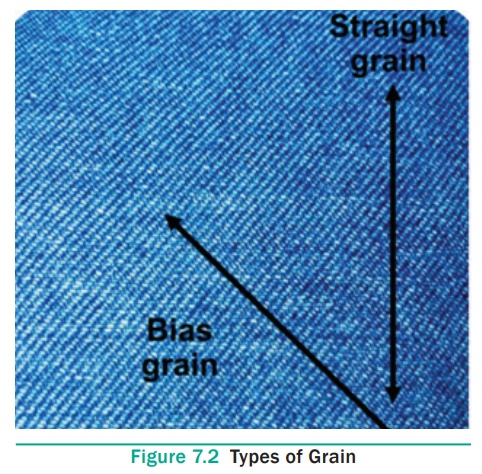Textiles and Dress Designing - Grain | 12th Textiles and Dress Designing : Chapter 7 : Identification of Fabrics and Preliminary Stitches in Garment Construction
Chapter: 12th Textiles and Dress Designing : Chapter 7 : Identification of Fabrics and Preliminary Stitches in Garment Construction
Grain
Grain
This is the term that explains the direction in which the fabric
is woven. It determines greatly by the way the fabric falls on the object or
the wearer. Understanding the grain helps in minimising the wastage and to
create interesting fullness effects on the garment. Grain refers to the
alignment of warp and weft yarns inside a fabric. When the fabric is selected
for construction the grain line is analysed. When grain is not in the proper
angle steps are taken to make it right. Also, diagonal grain is chosen when the
design requires more flexibility for good fit or fullness for decoration. The
common type of grain seen in garments is the straight grain. The main reason
for this is, to get full strength for the garment which can be obtained when
the garment is cut in the same direction as it was constructed. Apart from
this, the perfectly twisted warp yarns that work like a skeleton on the fabric
is very strong. The combination of that warp along with the weft will enable
good compaction and better properties when cutting a garment pattern. In order
to check if the fabric is on proper grain, one thread can be ravelled from
selvedge to selvedge and then the fabric is folded on half. If this can create
neat edge in the bottom, it is said that the material has been laid on proper
grain. There are different types of grain which are explained below:
1. On Grain
Lengthwise grain means the yarn in the fabric runs in the length
of the fabric and is parallel to the selvage. Crosswise grain has threads that
are perpendicular to the selvage of the fabric. The term on grain refers to the
length and crosswise thread being right angle to each other. This is very basic
in woven fabric as they are made by warp and weft interlaced at right angle to
each other.
2. Off Grain
When the warp and weft threads are not exactly at the right
-angled ways, they are termed to be in off grain. This is usually a defect and
methods are available to set the grain to the on-grain line.
3. Bias Grain
When the garment pattern is cut at 45 degrees it is called bias
grain. This has a good drape as it is taken in the diagonal way. Further
extending of the pattern tends to increase the fall of the fabric and gives
beautiful wavy effect.
4. On Grain Print
This is when the print is neatly lined up with the warp yarns and
is parallel to the selvedge. It is on grain print and results in a neat look of
the design on a fabric.

5. Off Grain Print
In contrast to the above on grain print, off grain is the printed
set of design which is not parallel to the selvedge. This can be considered as
a defect in printing as it directly implies poor quality in printing.
It is also important to remember that when the textile material is
made in a weaving loom or a knitting machine it will be in the perfect grain
only. During the various textile processes like washing, calendaring, scouring,
mercerisation the selvedge are held tight resulting change in the grain lines.
When the grain line is not maintained in the way it should be done, there are
chances for the fabric to lose shape, sag and even be uncomfortable to wear.
Related Topics